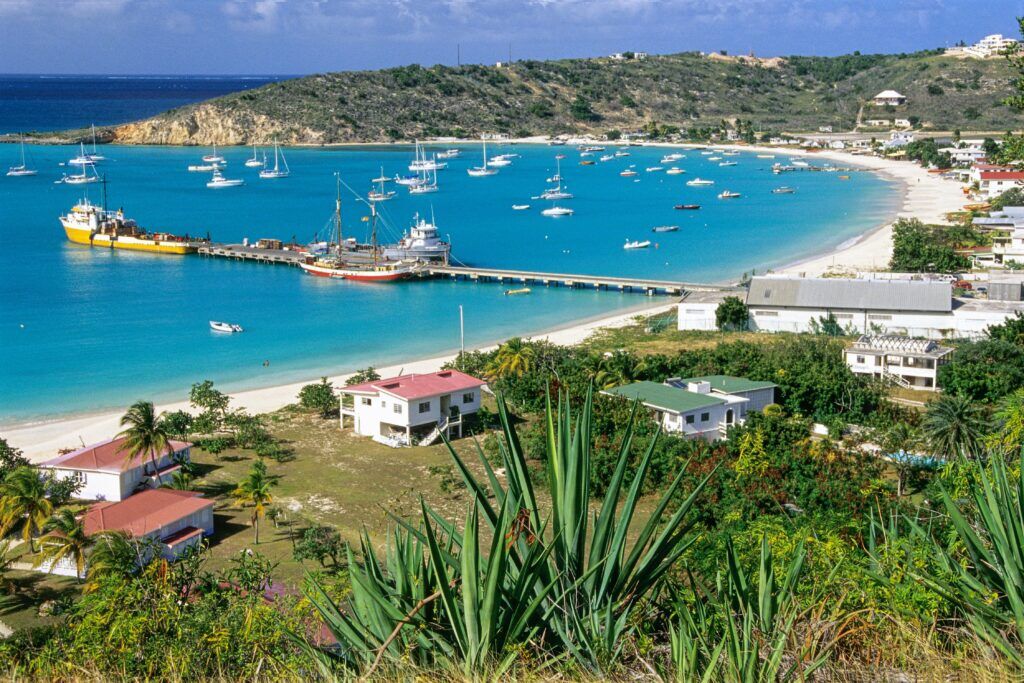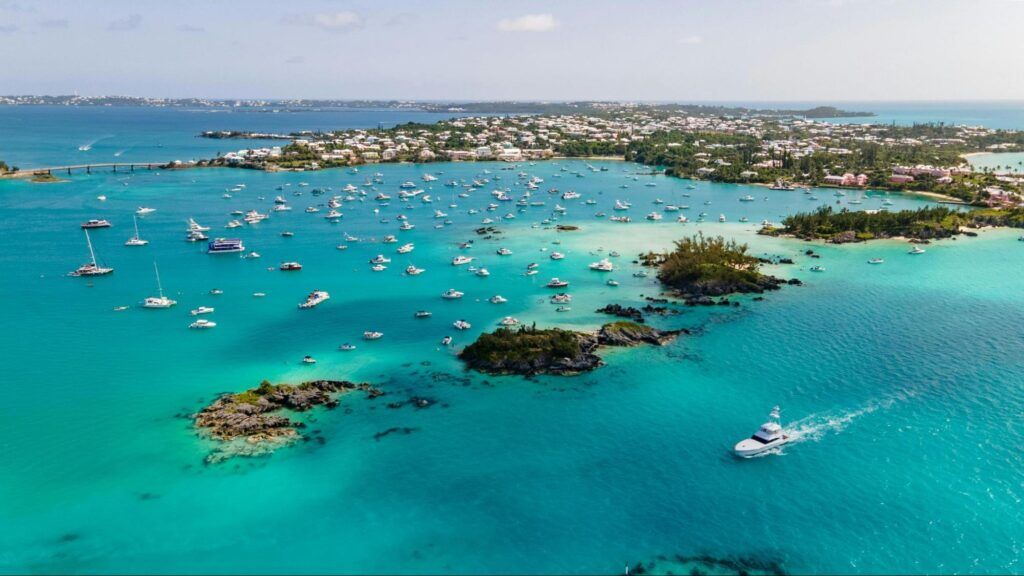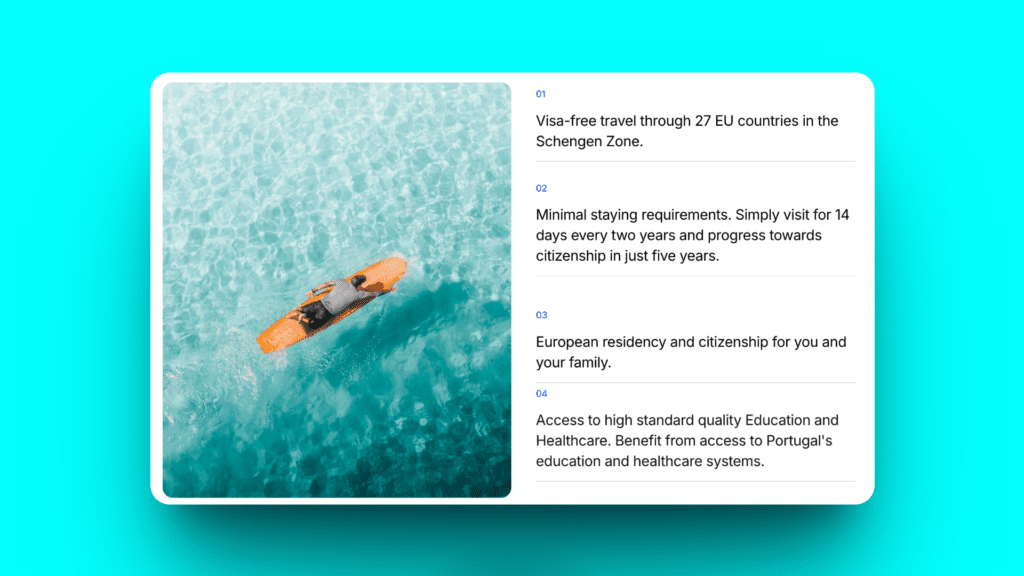Easiest Digital Nomad Visa: Work and Travel Without Hassle

For the enrichment of culture and, of course, economic benefits, countries now offer what is called a digital nomad visa to those with a remote job and a sense of wonder and adventure. But here’s the catch: many of them are buried in hidden fees or “gotcha” requirements. That’s why we’ve carefully compiled a list of the top 20 countries that offer a digital nomad visa, a logical step for those who dream of living in another country. Let’s find out which is the easiest digital nomad visa you can apply for.
What is a Digital Nomad Visa?
A digital nomad visa is a special type of visa built for remote workers that allows them to legally live and work in another country for an extended period without breaking immigration laws. This visa is offered to those who make a living earning money via a remote job, have investments, are freelancing, or run a business outside the host country.
It’s important to keep in mind that it does not allow you to take up local employment, so you must earn your income from abroad. Every country is unique with different sets of rules when it comes to these types of visas, but the overall process, on a fundamental level, is similar and looks like this:
- You must show all the required documents and prove that you work remotely for a foreign employer, own a business in another country, or are a freelancer.
- You must prove that you have a steady and stable source of income and can support yourself. Income requirements vary from country to country. However, generally, they aren’t particularly high, with many countries requiring about $50,000 per year.
- Once all documents are submitted, including proof of employment, bank statements, and health insurance, you must then pay the visa fee.
This is, in full disclosure, extremely generalized. So, before applying for a digital nomad visa for a country, it’s best to read up on them specifically to understand all the nuances and little details.
Benefits for Remote Workers
Getting a digital nomad visa has the obvious benefit of escaping the 9-to-5 grind and exploring the world without leaving your job behind. It also comes packed with a bunch of other benefits for remote workers, such as:
- You can stay six months to a few years without worrying about overstaying. This gives you the opportunity to explore cultures deeply without visa troubles hovering over you.
- With a digital nomad visa, you’re on the right side of the law and free from the risk of fines or deportation.
- Some countries offer tax breaks or even low/zero income tax for digital nomads, meaning more cash in your pocket. Places like Dubai and Barbados are known for these perks.
- Depending on which country you decide to go to, you can massively lower your living costs, especially when coming from the West. This indirectly allows you to enjoy a more lavish lifestyle in a new country with more savings on the same salary.
- These visas often allow you to open local bank accounts, sign up for long-term rental agreements, and even access health services.
- In some cases, these visas can lead to permanent residency down the road, so it gives you a more stable home base abroad. However, this isn’t guaranteed, nor should digital nomad visas be used for that purpose.
What Makes a Digital Nomad Visa Easy to Get?
Everyone who has ever seen work visa applications before understands that they are far from easy or convenient. From dealing with bureaucracy to attending appointments, the process is long and tedious. Digital nomad visas, on the other hand, defy this and make obtaining one as simple as possible. Besides having low-income requirements, here’s a list of reasons why a digital nomad visa is easier to obtain:
1. Minimal Paperwork & Simple Application Process
Paperwork isn’t particularly difficult, but it’s tedious and time-consuming. This slows the process down. The fewer documents required, the easier the process becomes. Many countries only ask for proof of income, remote work verification, health insurance, and a clean criminal record for digital nomad visas. Some countries, like Estonia, even allow online applications for added convenience.
2. No Sponsorship or Job Offer Required
For traditional work permits, applicants need a company to sponsor them. Here, you merely need to prove you’re making money remotely. If that amount meets the requirement, your application can be processed.
3. No Strict Education or Experience Requirements
There are no requirements for educational qualifications or years of experience within a specific industry. Digital nomad visas do not take these factors into account. As long as you’re earning remotely and meet the basic requirements, you’re good to go. Moreover, the visa approval process is fairly straightforward and takes less time than a traditional work visa.
Easiest Countries Offering Digital Nomad Visas
Every country has its set of rules and nuances when it comes to offering digital nomad visas, so it’s best to research the specific country you hope to visit. To make it easier, here’s a list of countries with the easiest processes and high selection rates. Some even offer unique perks.
1. Anguilla

This British Overseas Territory in the Eastern Caribbean has a fairly straightforward process with minimal paperwork. Its digital nomad visa, the Work From Anguilla Certificate, has an application process that takes around 15 days. However, the visa cost is on the higher side, which is $2,000 for a one-year validity, after which you’d need to reapply. Families are welcome, and a minimum monthly income of about $4,160 is required.
2. Portugal
Portugal’s digital nomad visa is an extremely tempting proposition for remote workers. The simple online application process makes it easy to apply. The visa is valid for a year, with plenty of options for renewal. You must have a monthly income of around €2,800-€3,000. Also, Portugal’s Golden Visa program is available for investors, requiring a minimum investment of €500,000 (or an alternative qualifying investment). While more resource-intensive, it offers a pathway to EU residency with low physical presence requirements.
3. Antigua and Barbuda
If you’re looking for a longer stay from the outset, the Caribbean islands of Antigua and Barbuda offer you the chance to live there for up to two years with no local sponsorship requirements. The process requires minimal documents and allows online applications. The application fee is $1,500, and you will receive an update within 5–7 business days. The minimum income requirement is $50,000 per year.
4. Barbados
The Barbados Welcome Stamp is a special visa program introduced in 2020 to attract digital nomads to call this Caribbean island their new temporary home for 12 months, with the potential for renewal. The application cost is $2,000, with a higher price for family bundles.
5. Bermuda

Bermuda welcomes remote workers and university students attending online classes to live on the island for one year through its digital nomad visa program, which is renewable on a case-by-case basis. There is no set minimum income requirement, but you must provide bank statements to prove you can support yourself. Family inclusion is also possible.
6. Cape Verde
If you wish to live in an island paradise, Cape Verde’s Remote Working program makes it possible.
- Valid for 6–12 months
- No complicated income requirements
- Just show proof of €1,500/month in your bank account
The best part is that you can apply online. Once it’s approved, you’ll have 30 days to land in Cape Verde and submit your documents. And to make it even better, your visa gets issued within 5 days of arrival, and you can bring your family along.
7. Colombia
Colombia’s Visa V Digital Nomads program aims to make the country highly appealing for remote workers. You can expect an answer within 30 days of submission, and the minimum monthly income requirement is only $1,100.
8. Costa Rica
Costa Rica’s “Pura Vida” philosophy makes it a popular choice for digital nomads. The country offers a visa option that allows you to live tax-free for up to two years. You will receive a response within 14 days after all necessary documents are provided.
9. Curaçao
@Home in Curaçao is a program designed for travelers, investors, and remote workers seeking a temporary home away from home. This digital nomad visa is valid for 6 to 12 months and has a fast processing time of about 30 days, with fees of only around $300.
You must prove a steady income of approximately $2,500 per month, making it an attractive option for professionals who wish to relocate with their families.
10. Dominica

Dominica’s WIN (Work In Nature) Program has quickly become popular among digital nomads in the Eastern Caribbean. This English-speaking island offers a visa that allows nomads to reside on the island for up to 18 months. The application process is efficient, typically taking between 14 and 28 days. To qualify, you need to show a minimum annual income of $50,000.
The visa fee is set at $800 for individuals and $1,200 for families, and the required documents include a passport copy, proof of international health insurance covering Dominica, and evidence of remote work and income verification in English. Everything is submitted online, but applicants must visit Dominica within 30 days of visa approval.
11. Dubai (UAE)
Entering the UAE through its Virtual Working Program always seemed to be on the pricier side, but it has relaxed its requirements. It now offers a one-year residency for remote workers earning at least $3,500 per month. Applying is easy and completely online, and the processing time is merely seven days. A major seller for Dubai’s digital nomad visa is the perks it comes with, like schooling for local children, the ability to open bank accounts, and even the option to apply for loans. This has made it a very practical option for remote workers who have a family.
12. Grenada
Grenada is a solid option if you’re thinking about relocating to the Caribbean. English is their official language, and there are no local income tax requirements, making it super remote worker-friendly. The only catch? You’ll need to apply the old-school way. That means mailing a physical package with your documents and a fee, which is $1,500 for individuals or $2,000 for families. It must be sent directly to the Grenadian Embassy in Washington, D.C. Once that’s done, you’re one step closer to enjoying tax-free island life.
13. Hungary
Hungary’s digital nomad visa is one of the easiest to apply for in Europe, with low-income requirements, minimal paperwork, and a validity of up to one year. However, the main drawback is that you must attend an in-person interview and appointment. If that’s not a dealbreaker, the process is fairly simple, with approvals typically taking about a month.
14. Malaysia
Malaysia’s digital nomad visa, known as the Professional Visit Pass, allows you to stay in the country for up to 12 months, with the option to renew for another year. Processing time is around 30 days, and the application fee is relatively low at $220 per person, with an additional $110 for dependents. However, the visa is only available to those working in digital industries, such as content creators, IT professionals, and digital marketers.
15. Malta

Malta offers a one-year digital nomad visa, which can be extended up to three years. The visa fee is relatively low, and you must demonstrate a minimum monthly income of approximately €2,700. Additionally, Malta has a separate Golden Visa program for investors, which requires an investment of around €500,000 and offers a pathway to long-term EU residency and eventual citizenship.
16. Mauritius
Mauritius has one of the easiest digital nomad visas in the world, as applications are free and approvals are typically granted within two days. You must show proof of remote income, usually requiring between $1,500 and $2,000 per month. You can also include family members in your application.
All the necessary documents must be submitted in English or French.
17. Namibia
Namibia’s digital nomad visa allows you to live in the country for six to twelve months. The application process is fully online, and the fee is only $62. However, you must prove a monthly income of at least $2,000.
18. Uruguay
Uruguay offers a fully online application process with a visa fee of just $10 upon collection. The country has no stated income requirements, making it accessible to a wide range of digital nomads. The cost of living is also reasonable, as a single person can live comfortably on $1,500 per month. With no local income tax and a business-friendly environment, this country is an attractive option for remote workers.
19. Albania
Albania introduced its digital nomad visa in 2022, offering an initial one-year stay, extendable up to five years. There’s no official minimum income requirement, but it’s recommended that you earn more than the country’s minimum wage to improve your approval chances. Visa costs range from $67 to $107.
20. Croatia

Croatia’s digital nomad visa takes around two months to process and costs $139. You must show proof of a monthly income of $2,658. However, the visa is not renewable, so if you’re looking for long-term stays, it’d be better to consider other options.
How Bitizenship Makes Your Digital Nomad Life in Portugal Easier

If living in Europe is your goal, and you’re a crypto-first investor or remote entrepreneur seeking something more permanent than a digital nomad visa, Portugal’s Golden Visa is a powerful alternative. It gives you long-term freedom to live, work, and invest in Europe without constantly renewing your visa. And the cherry on top? Bitizenship makes the entire journey super smooth.
We help you skip the paperwork and legal headaches so you can focus on growing your business and living your best life. Here’s precisely how we make the entire process simpler:
- Expert Guidance: Having over a decade of experience and 110+ successful visa applications, it only makes sense for us to walk you through every step, including choosing the right investment and handling the paperwork.
- Done-For-You Service: We collaborate with top lawyers and tax experts in Portugal so you don’t waste time figuring things out on your own.
- Family-Friendly: The Portugal Golden Visa allows you to include your spouse and children, giving your whole family a secure path forward.
- Long-Term Benefits: While most digital nomad visas expire in a year or two, the Golden Visa can lead to permanent residency and even citizenship in the EU.
Bitizenship is your shortcut to making your digital nomad lifestyle official, minus the stress. Less hassle. More adventure. Get in touch to Invest in Portugal Golden Visa today.
Closing Thoughts
Digital nomad visas open up a world of opportunity by offering a legal and straightforward way to transform your lifestyle. A tip to keep in mind is to master your destination’s fine print. Think about income thresholds, residency rules, and tax implications before applying. With the support of a platform like Bitizenship, you can sidestep bureaucratic headaches, fast-track visa approvals, and even unlock smart tax strategies.
FAQs
What is the easiest country to be a digital nomad in?
The easiest country for a digital nomad depends on visa requirements, ease and cost of applications, and overall cost of living. Considering these factors, Portugal, Albania, Costa Rica, Cape Verde, and Colombia offer simple digital nomad visa processes with reasonable income requirements and fast approvals.
What is the easiest nomad visa to get?
An easy nomad visa would have minimal paperwork, low or no income requirements, and a simple, fast, and online application process. Some of the easiest to obtain include those from Mauritius, Albania, Colombia, and Cape Verde.
What is the fastest digital nomad visa to get?
In terms of processing time, Dubai, Bermuda, and Barbados are among the fastest, with approvals typically taking less than a month. Dubai stands out, with approvals usually granted within 2–3 weeks.
What is the lowest-income requirement digital nomad visa?
Albania and Colombia have some of the lowest income requirements, at $815 per month and $750 per month, respectively.


